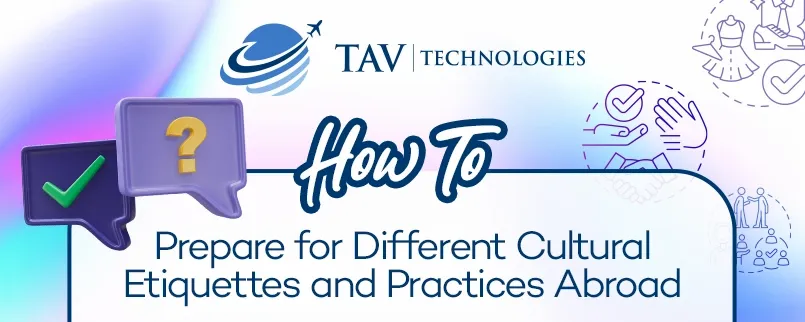
Jul 2024
Traveling to a new country is an exciting adventure filled with opportunities to explore diverse cultures and traditions. However, to ensure a respectful and enjoyable experience, it’s essential to understand and adhere to the local customs and etiquette. Cultural etiquette refers to the code of behavior that is considered acceptable and respectful in different cultures. Here’s a guide on how to prepare for different customs and practices abroad.
Research Before You Go
Understanding the cultural norms of your destination begins with research. Look into the country’s customs, traditions, and societal norms through websites, travel guides, and cultural blogs. Learning a few key phrases in the local language, such as greetings, thank you, and please, can go a long way in showing respect. Additionally, check the appropriate attire for different settings, such as religious sites, formal occasions, or casual outings.
Respect Local Greetings and Gestures
How people greet each other can vary widely across cultures. In many Western countries, a firm handshake is common, while in some Asian countries, a softer handshake or a bow may be more appropriate. In countries like France or Argentina, cheek kissing is a common greeting, whereas in Japan, bowing is preferred over physical contact. Be mindful of hand gestures, as they can have different meanings; for instance, the “thumbs up” sign is positive in some cultures but offensive in others.
Culinary Customs and Manners
Meal times are rich with cultural significance and traditions. Learn the basic table manners of your destination. For example, in Japan, slurping noodles is a sign of enjoyment, while in China, it’s customary to leave a bit of food on your plate to show you’re full. Tipping practices vary widely; in the United States, tipping is expected, whereas in Japan, it can be considered rude. Familiarize yourself with the use of utensils, such as chopsticks in many Asian countries or injera (a type of bread) and hands in Ethiopia.
Respect Religious Practices
Religious beliefs and practices are deeply ingrained in many cultures. When visiting religious sites, dress conservatively by covering your shoulders, knees, and sometimes your head, depending on the location. In many cultures, such as in South Asia and parts of the Middle East, it’s customary to remove your shoes before entering a home or a place of worship. Show respect by being quiet and reflective in sacred spaces, avoiding loud conversations, and always asking for permission before taking photos.
Understand Social Norms
Social interactions can be complex and context-specific. In some cultures, close physical proximity during conversations is normal, while in others, maintaining a certain distance is preferred. Be aware of gender-specific customs, as interactions between men and women who are not related can be limited or have strict boundaries in some cultures. Learn about the customs around gift-giving, including how gifts are wrapped and presented, as it can be an important ritual in some cultures.
Be Mindful of Public Behavior
Behavior that is acceptable in one culture might be frowned upon in another. Public displays of affection, such as holding hands and kissing, are common in many Western countries but can be inappropriate in more conservative societies. Respect the local customs for queuing; in some places, orderly lines are expected, while in others, queuing can be more informal. Be conscious of how loudly you speak, especially in public places, as normal volume in one country could be considered disruptive in another.
Adapt and Show Flexibility
Flexibility and a willingness to adapt are key to a respectful travel experience. Observe the behavior of locals and try to follow their lead, helping you blend in and show respect for their customs. If you’re unsure about a particular custom or practice, don’t hesitate to ask. Most people appreciate the effort to learn and will be happy to explain. Remember that you are a guest in another culture; approach differences with an open mind and a humble attitude.
By taking the time to understand and respect the cultural customs and practices of your destination, you can enrich your travel experience and foster positive interactions with locals. Embrace the opportunity to learn and grow from these diverse cultural encounters. Safe travels and enjoy your cultural exploration!
